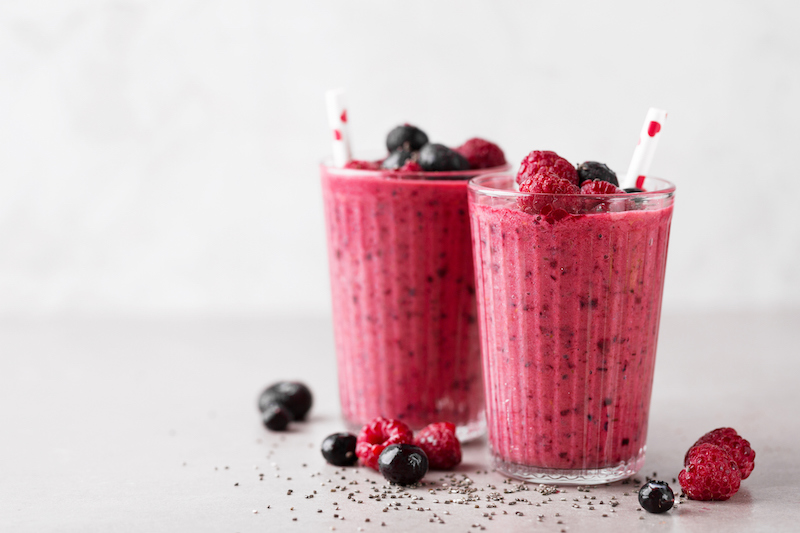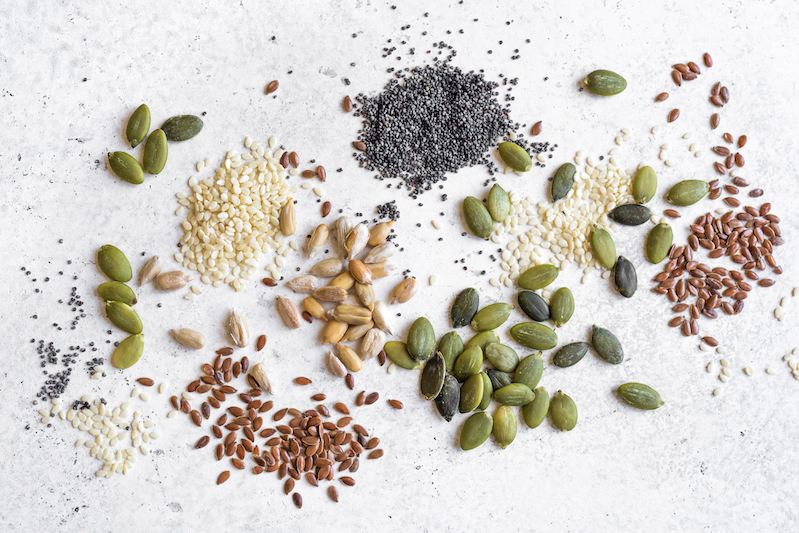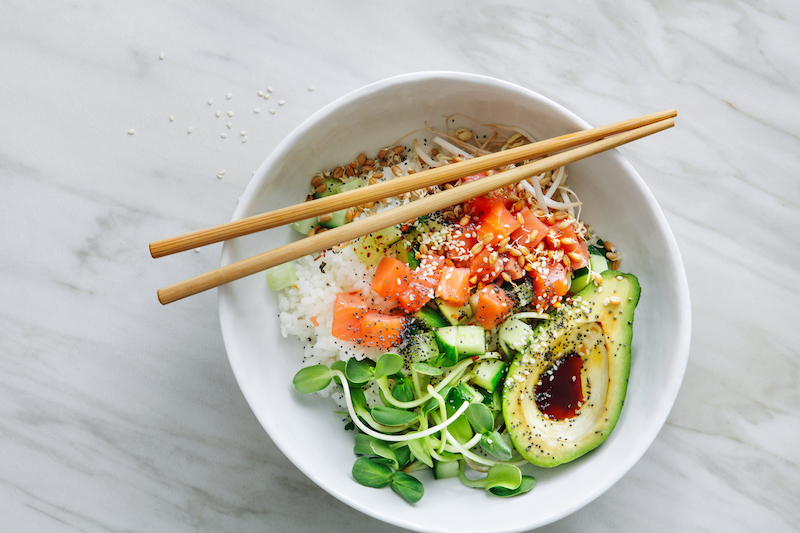Throughout your 40s and 50s, food can be instrumental in alleviating the symptoms of shifting hormones. Optimal nutrition helps reduce mood swings, depression, anxiety, and irritability while boosting energy. Want to harness the power of food to relieve hot flashes, night sweats, weight gain, acne, hair loss, and vaginal dryness — and help balance your hormones? Dig in.
Focus on Gut Health
The merits of gut health — revered by Chinese, Indian, and Japanese doctors for thousands of years — are now mainstay in Western medicine. Given the domino effect of menopause, with depleting estrogen impacting cortisol and cortisol controlling digestion, gut imbalances can exacerbate already off-kilter hormones.
It’s no wonder our craving for digestive wellness has created a $50 billion probiotics market as we strive to rebalance. As the number of probiotic foods has more than tripled in recent years, surpassing its yogurt and kombucha origins, you can fulfill your one to two daily servings with anything from cheese, oatmeal, and sourdough breads to pizza, waffles, and cookies — though we don’t advise eating a bunch of highly processed foods (read on).

Eat Real Food
Regardless of your chosen dietary style — paleo, keto, pescetarian, vegan, or anything goes — these guidelines can nourish you to better hormonal health.
Get more clean protein. Try to eat 75 to 100 grams daily (depending on your weight and activity level) of basics such as organic chicken, organic grass-fed beef, and wild-caught fish, and consider plant-based sources of protein (beans, lentils, and seeds/nuts).
Indulge in cruciferous vegetables. Aim for at least 1 cup per day of broccoli, Brussels sprouts, cabbage, cauliflower, bok choy, turnips, kale, and/or arugula. They are known to stimulate detoxifying enzymes in the gut and liver, according to Memorial Sloan Kettering Cancer Center, thanks to a compound called indole-3-carbinol (I3C) that “helps the body eliminate excess estrogen,” according to North American Menopause Society certified practitioner Dr. Jennifer Pearlman. Steam lightly, she notes, to maximize the I3C.
Maca root, while a cruciferous vegetable and considered the “ultimate natural HRT” by some can be taken as capsules or in powder form. One study showed that in postmenopausal women, it acts as a hormonal toner and that “changes in hormone levels [were] accompanied by substantially reduced feeling of discomfort associated with menopause.” Though a 2018 analysis of all the research determined that “health claims of maca cannot be fully supported from a scientific standpoint and more research is needed.” Consult with your doctor if you want to try it.
Go berry picking. Rich in immune-boosting vitamin C and packed with antioxidants, which decrease inflammation and regulate cortisol, berries are the model fruit. Raspberries, blueberries, blackberries, and strawberries are low in sugar and delicious in smoothies, on salads, or by the handful. Eat a cup of berries every day.
Reach for plant-based fats. The body uses cholesterol to make certain hormones, like estrogen and testosterone, and those hormones suffer without healthy fats (so does your brain and skin). Avocados are rich in fiber and help balance hormones. Other sources of “good” fat include extra-virgin olive oil, ghee, coconut oil, and walnuts. It’s important, however, that you don’t overdo avocado and nuts — especially if you’re trying to lose weight.
Feed your liver. The liver is what Chinese medicine calls the “the powerhouse of all hormone production and metabolism.” For optimal liver health, limit alcohol and caffeine, in addition to doing the healthful things outlined above. Common herbs and spices such as rosemary, cilantro, turmeric, ginger, and peppermint also help the liver do its job. Plus, they make the food you cook taste even better.

Explore seed cycling. The Chinese are credited for this trend to balance hormones using seed nutrients; its efficacy is anecdotal to date, but seeds are loaded with nutrients, so it surely doesn’t hurt. Dr. Katherine Takayasu at Stamford Health in Connecticut recommends the following routine:
- Follicular phase (days 1-14): On the first day of your period for two weeks, eat 1 tablespoon of ground organic raw flaxseeds and 1 tablespoon of ground organic raw pumpkin seeds daily to balance estrogen and support upcoming progesterone production.
- Luteal phase (days 15-30): From midcycle until you start your period again, eat 1 tablespoon of ground organic raw sesame seeds and 1 tablespoon of ground organic raw sunflower seeds daily to block excess estrogen and support progesterone.
Be Kind to You
When you’re eating for optimal health, sleeping well, and getting daily exercise, you’re doing the right things for your hormones — and your overall well-being. And if you have a glass of wine and rich dessert and then wake up in a puddle of sweat, don’t beat yourself up.
Just remember that you can have your cake and your hot flash, too. And tomorrow is another day.
Photos: Luchezar, Nerudol, Mizina
